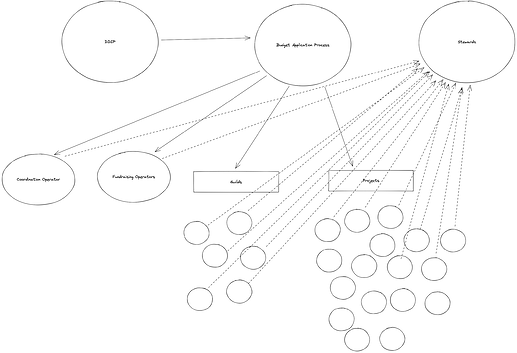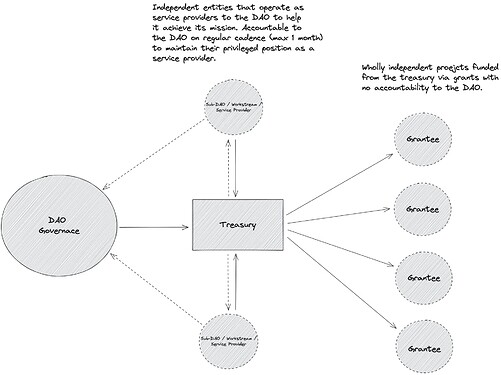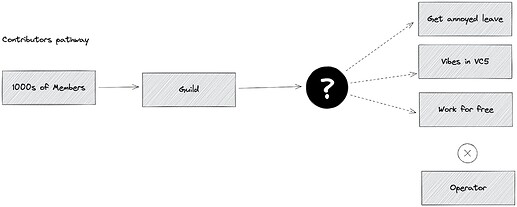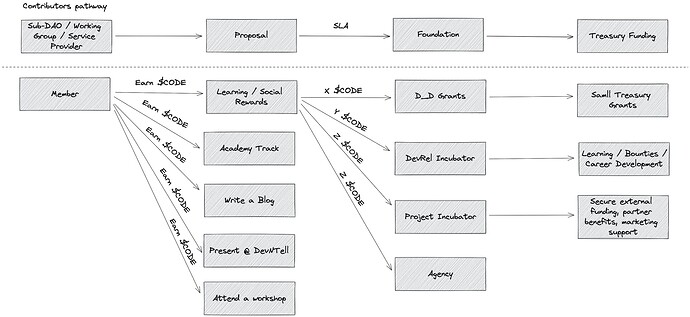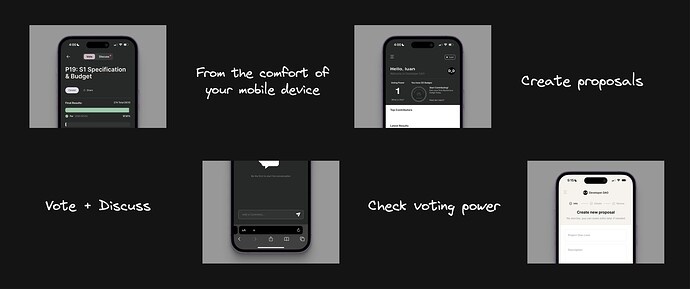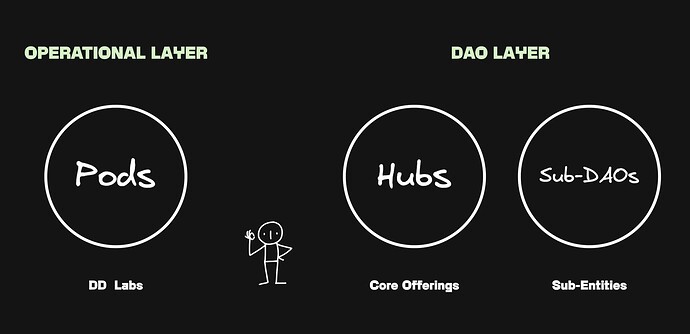I fully support minimizing the power of large token holders. Setting a hard cap sounds like another extreme though. Something like an inverse quadratic function would work best IMO.
Yes. I wouldn’t say bureaucratic, but indeed, large organizations have a tendency to slow down and become inefficient.
I voted against it, but I think there are solid points that support that. I agree with pursuing the outcome: fostering the social experience. Would be great if we can define this as an experiment though (what are the starting conditions, what we change, what is expected outcome).
IDK ![]() No strong opinion on that.
No strong opinion on that.
Totally behind this, this is actually long overdue. What is necessary though is to define a success criteria for pods that are going to receive funding. In a sense of “you are doing xyz to support our mission, for this amount of tokens”. It would be also great if we can move this function to trustware layer, not sure if there is a good tooling for that though.
Bankless DAO is talking about moving away from this model, because it’s becoming a popularity contest, and also because it is hard for DAO members to keep up with the admin of monthly Coordinape rounds (light lift to be sure, but when you have 278 discord notifications every day…)
Brilliant post @kempsterrrr and my gratitude extends to everyone whose work you have cited here as well, including @Erik_Knobl @ntindle @Colin4ward and others.
I think that all four of the bullets in the tldr represent a logical evolution of D_D based on what has been learned over the past year, and especially since the launch of the $CODE token.
I’ll apply today with a handful of DAO members if this opens up.
My attempt to visualise the current structure ![]()
Something I think could be far simpler (obviously a lot of detail needs defining, has been chatting a lot in the DMs with folks, in particular @Bobbay, who has helped design systems in several other DAOs such as balancer. We both quite like Gitcoin’s Governance framework as a model to clarify things far better.
Trialling this in the dev guild with POAPs, and $CODE, which is definitely increasing participation and connections but time will tell. fully support smaller experiments where we can do them.
This is essentially how I see the current contributor pathway:
and a new way I think we should consider working towards (which would introduce $CODE utility):
My thoughts are $CODE rewards (far higher than currently) for the overwhelming majority of people who play the game; attending workshops, completing learning, write blogs, present to DevnTell etc. Earning $CODE passed certain levels gives them access to small grants rounds, DevRel incubator etc. to realise more value than just learning, gamify the system and add utility to the token.
Then we set a much higher bar for folks that want to create Sub-DAOs / Service Providers / Workstreams that legally live outside of the DAP and have SLAs, but these must all be independently sustainable as we don’t have the finances to sustain them otherwise. i.e. they’re delegated privilege to provide a service the DAO that includes using the DAO to generate revenue and they pass X of that back to the DAO.
They should be free to organise their work in the best way they see fit (i.e probs not in D_D discord) to deliver on their SLAs with The DAO experience/funnel that supports that contributor pathway, including potentially ending guilds ![]()
I was on call with Rachel Rose from Opolis yesterday and what she shared as an elevator pitch sounds very much like your last two paragraphs. Could it be perhaps interesting to get in touch and gather some experiences? They are not running on pods though IMO, it was a really brief introduction - I am writing this just because the endgame sounds similar.
Always interested in jamming with folks ![]() struggling to parse the synergy based on my admittedly very limited knowledge of Opolis but they’re great people doing great things so love to exchange ideas/notes! Shoot me a DM if you want to set something up.
struggling to parse the synergy based on my admittedly very limited knowledge of Opolis but they’re great people doing great things so love to exchange ideas/notes! Shoot me a DM if you want to set something up.
Hey guys, interesting discussion! I hope you figure out a way that uses gamification but is not abused.
I am doing research on “the advantages and disadvantages of DAOs compared to traditional companies”. The research is part of my Master’s thesis and the paper might get published. The aim is to help DAOs make better design choices. Additionally, it should help traditional companies understand if and which part of their business processes they might want to move on-chain.
It seems like you guys are struggling a bit with organizational design. I would be very interested in your first-hand experience of what it is like to be part of a DAO including the bright sides but also the problems you face.
Is there someone in your organization willing to help with my scientific research by giving a short interview (max. 30-min) in December sharing their experience with DeveloperDAO? I think it could be mutually beneficial.
You can reach me via: m.f.liebschner@student.rug.nl
I hope to hear from you!
All the best, Miro
I think starting with one well defined path isn’t a bad thing. Starting with 5 poorly defined paths is.
Does that make sense?
Probably not going to happen, radio silence from Opolis now.
Yes.
Yes, we definitely should. I’m meeting with the founders of Otterspace and Rep3 this week, regarding potentially utilizing badges as part of a redesign of the member UX.
If I like what I see, then I’ll move forward with building this out. If implemented well, it can add greater meaning to what has so far been a linear member UX, as well as one-sided/monolithic (the belief that everyone wants to be a ‘contributor’).
Badges can potentially help to make the member UX layered and thus, more valuable. Some great experimentation can happen. To quote something I mentioned to @wolovim during the early hours, regarding the Events initiative I’ve undertaken (I was mentioning how the existence of DD Labs enables us to operate in ways we previously weren’t able to):
I went on to talk about monetization stuff, but all in all: I’m 100% pro re-designing the existing $CODE reward model to better fit into a non-contributor context.
I know we’ve largely discussed this in the context of Agency, but I’m pro the idea being applied across the broader DAO.
Keen to read your thoughts ![]()
![]()
Agreed. Non-contributors should come first. Prioritize the majority, for sure.
Re-defining the governance aspect of the DAO will be critical. When the $CODE token launched, I found myself navigating enquiries into whether people should obtain $CODE, or a Genesis NFT off secondary. And it forced me to learn how to properly contextualize what they offer, relative to governance. Reframing governance and being able to properly (and succinctly) communicate that, will be an important part of helping to increase voter turnout.
People want to vote on shit that is meaningful to them. The bulk of DAO members do not actually give a fuck about what is happening at the Operational layer, so far there is no misconduct.
Yes. Very well put.
Agreed.
Drawback to this approach is that it relies on others to have an accurate and fair appraisal of someone’s participation. I know I’ve raised this previously, but this is heavily flawed. It’s something I’ve critiqued in my job, too. It’s largely arbitrary. And given that web3 (and subsequently DAO’s) are a microcosm, we need to be mindful about not creating structures or processes that are not equitable.
Also, this DAO is very siloed and has shown to be cliquish at times. It’s something I’ve publicly called out for the better part of ~6 months. I’ve also spoken with the Onboarding team about the importance of ensuring all new members feel welcomed, irrespective of whether or not they work at a prominent web3 company/org. I just think that we already exhibit behaviours that leave me questioning whether this can work well enough.
Happy to be challenged on the above points.
Much better approach. Particularly because it’ll happen in the moment. Maybe each DAO member gets allocated a certain amount. And rather than retroactively trying to recollect who participated, tips happen in the moment and then get paid out at intervals?
The Town Hall team had planned to gift some $CODE tokens to members who held all 4 of our S1 POAP’s. Just as a one-off treat for turning up and engaging.
I might still go ahead with this, based on those who hold all 3 POAP’s ![]()
![]() I’ll give it some further rumination.
I’ll give it some further rumination.
In any case, as mentioned in my comment above (see: Link) - I’m meeting with Rep3 and Otterspace later this week. Will follow up after my meetings.
Agreed.
Happy that this idea is being re-visited. I’m 100% in support. It’s something we’d previously discussed, when we were trying to map out a ‘Public Goods Guild’.
Great discussion. I’ll catch up when I’m back
Someone say fun? See: Link
Platform: Mysterious.io
See: Link
To pull an excerpt from what I proposed:
Agreed.
I’m pretty much aligned on all of this.
My proposal is that we abolish Guilds. Rebrand the ones which need to remain as ‘Pods’ (i.e. workgroups), and move them into an entirely new server. I created a new server last night btw. Will begin building it out, as this conversation develops.
Voting should. But this shouldn’t be directly communicated. I fear it can influence people into voting, who may have otherwise abstained. Retroactively rewarding voters who selected YES or NO, feels good to me (in theory).
Fairly certain Gitcoin open-sourced their Passport offering. I like the idea of adapting something within a D_D context. But it’s not mandatory. Just a thought.
This will likely remain an unknown until we actually implement some shit.
Can you elaborate on this question, please?
My proposal is that some SubDAO’s will likely be enveloped into the DAO itself. DevDao Women is a textbook example, and thus makes sense to be wholly owned by the DAO — even though it’s led by @meowy. However, some other SubDAO’s should be majority-owned by the people who founded it. This touches on some of the discussions we had in the Steering Committee (cc: @Wikist @chuck25 @Colin4ward @Erik_Knobl @myz1237.eth), but I think that based on my own interpretation of SubDAO’s (see the excerpt above); Developer DAO should have a sensible ownership stake.
If a SubDAO exists (at least in part) to feed into the DAO member experience, and we’re providing access to Developer DAO members, then that constitutes a partnership. And equity should be discussed as such.
No, not by default. There needs to be a sensible case for it.
Mate, I aged 3 years between when I started reading and when I finally finished.
Jokes aside, this was very well structured, and I appreciate the time it took to put this together.
